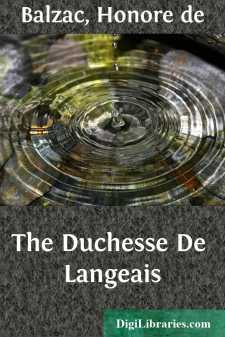Categories
- Antiques & Collectibles 13
- Architecture 36
- Art 48
- Bibles 22
- Biography & Autobiography 815
- Body, Mind & Spirit 144
- Business & Economics 28
- Children's Books 18
- Children's Fiction 14
- Computers 4
- Cooking 94
- Crafts & Hobbies 4
- Drama 346
- Education 58
- Family & Relationships 59
- Fiction 11833
- Games 19
- Gardening 17
- Health & Fitness 34
- History 1378
- House & Home 1
- Humor 147
- Juvenile Fiction 1873
- Juvenile Nonfiction 202
- Language Arts & Disciplines 89
- Law 16
- Literary Collections 686
- Literary Criticism 179
- Mathematics 13
- Medical 41
- Music 40
- Nature 179
- Non-Classifiable 1768
- Performing Arts 7
- Periodicals 1453
- Philosophy 65
- Photography 2
- Poetry 896
- Political Science 203
- Psychology 44
- Reference 154
- Religion 515
- Science 126
- Self-Help 85
- Social Science 82
- Sports & Recreation 34
- Study Aids 3
- Technology & Engineering 59
- Transportation 23
- Travel 463
- True Crime 29
Sort by:
by:
Honore de Balzac
FACINO CANE I once used to live in a little street which probably is not known to you—the Rue de Lesdiguieres. It is a turning out of the Rue Saint-Antoine, beginning just opposite a fountain near the Place de la Bastille, and ending in the Rue de la Cerisaie. Love of knowledge stranded me in a garret; my nights I spent in work, my days in reading at the Bibliotheque d'Orleans, close by. I lived...
more...
by:
Honore de Balzac
PROLOGUE Certain persons have reproached the Author for knowing no more about the language of the olden times than hares do of telling stories. Formerly these people would have been vilified, called cannibals, churls, and sycophants, and Gomorrah would have been hinted at as their natal place. But the Author consents to spare them the flowery epithets of ancient criticism; he contents himself with...
more...
by:
Honore de Balzac
INTRODUCTION In hardly any of his books, with the possible exception of Eugenie Grandet, does Balzac seem to have taken a greater interest than in Le Medecin de Campagne; and the fact of this interest, together with the merit and intensity of the book in each case, is, let it be repeated, a valid argument against those who would have it that there was something essentially sinister both in his genius...
more...
by:
Honore de Balzac
PROLOGUE Certain persons have interrogated the author as to why there was such a demand for these tales that no year passes without his giving an instalment of them, and why he has lately taken to writing commas mixed up with bad syllables, at which the ladies publicly knit their brows, and have put to him other questions of a like character. The author declares that these treacherous words, cast like...
more...
by:
Honore de Balzac
TRANSLATORS PREFACE When, in March, 1832, the first volume of the now famous Contes Drolatiques was published by Gosselin of Paris, Balzac, in a short preface, written in the publisher's name, replied to those attacks which he anticipated certain critics would make upon his hardy experiment. He claimed for his book the protection of all those to whom literature was dear, because it was a work of...
more...
by:
Honore de Balzac
THE DUCHESSE OF LANGEAIS In a Spanish city on an island in the Mediterranean, there stands a convent of the Order of Barefoot Carmelites, where the rule instituted by St. Theresa is still preserved with all the first rigor of the reformation brought about by that illustrious woman. Extraordinary as this may seem, it is none the less true. Almost every religious house in the Peninsula, or in Europe for...
more...
by:
Honore de Balzac
THE FAIR IMPERIA The Archbishop of Bordeaux had added to his suite when going to the Council at Constance quite a good-looking little priest of Touraine whose ways and manner of speech was so charming that he passed for a son of La Soldee and the Governor. The Archbishop of Tours had willingly given him to his confrere for his journey to that town, because it was usual for archbishops to make each...
more...
by:
Honore de Balzac
A DRAMA ON THE SEASHORE Nearly all young men have a compass with which they delight in measuring the future. When their will is equal to the breadth of the angle at which they open it the world is theirs. But this phenomenon of the inner life takes place only at a certain age. That age, which for all men lies between twenty-two and twenty-eight, is the period of great thoughts, of fresh conceptions,...
more...
by:
Honore de Balzac
PART I Mme. de Bargeton and Lucien de Rubempre had left Angouleme behind, and were traveling together upon the road to Paris. Not one of the party who made that journey alluded to it afterwards; but it may be believed that an infatuated youth who had looked forward to the delights of an elopement, must have found the continual presence of Gentil, the man-servant, and Albertine, the maid, not a little...
more...
by:
Honore de Balzac
THE COMMISSION IN LUNACY In 1828, at about one o'clock one morning, two persons came out of a large house in the Rue du Faubourg Saint-Honore, near the Elysee-Bourbon. One was the famous doctor, Horace Bianchon; the other was one of the most elegant men in Paris, the Baron de Rastignac; they were friends of long standing. Each had sent away his carriage, and no cab was to be seen in the street;...
more...











